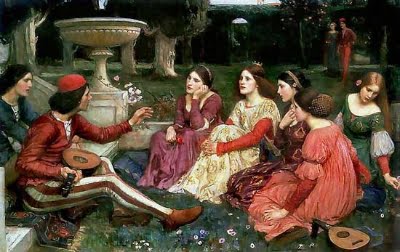The Decameron s a novel by Italian author Giovanni Boccaccio. The plot of the book is set in Italy during the time of the Black Death (a plague resulting in deaths of 75 to 200 million people across Europe and Asia). During the plague, a group of seven young women and three young men flee from Florence to a deserted villa in the countryside for two weeks. During the evenings, every member tells a story each night, except for one day per week for chores, and the holy days during which they do no work at all. The end result is ten nights of storytelling over the course of two weeks, and by the end of the fortnight, they have told 100 stories.
The primary title exemplifies Boccaccio’s fondness for Greek philology, as the book combines two words, one meaning ten and the other day, forming a term that literally translates to “ten-day event”.
A common perception among historians is that the supposed obscenity led to the book being banned and suppressed here and there by powerful groups. For example, the Roman Catholic Church banned the book, but knew they cannot eventually obliterate the widely circulated work. In the end, they tried to fix it, but later on that.
While many people focus on the sexual obscenity of The Decameron, the book actually has a wide medical and historical significance.
The historical significance of The Decameron
The Decameron is primarily a work of fiction. But the introduction of the book has emerged as an important historical record of the social, physical, and psychological effects of the previously unknown “Yersina pestis” bacteria. This was the bacteria causing the Black Death. It is one of the most devastating pandemics in human history, resulting in death of an estimated 75 to 200 million people in Eurasia and Europe. The bacteria result in different forms of plague.
The Decameron provides a philosophical insight into the medieval psyche as Europe faced the alarming and unprecedented epidemic of the 1348 Black Plague. Whether Boccaccio was in Florence as the Black Plague swept the city is uncertain. However, one thing is certain without a doubt, and that is that he had access to authentic information on the abject suffering caused by the plague, as well as the social ramifications.
The author managed to discuss the contemporary view that the plague was from the uncivilized East, “where it propagated itself without respite from place to place and so calamitously had spread into the West”, and the alternate belief that the pestilence had been sent by “God in His just wrath by way of retribution for our iniquities”.
The Decameron provides a valuable insight to the altered human moral behavior during the Black Plague. For starts, the willingness to persecute foreigners and Jewish people, the harsh ostracism of the sick, the self-imposed exile of the healthy, and much more. Boccaccio mentions the deterioration of social institutions, including medical, religious, public health, and legal, as well as their inability to affect and take any control of the progress of the disease.
Nowadays, the Decameron remains one of the most famous surviving documents detailing the effects of the Black Plague. While his profession as a novelist and poet raises questions regarding authenticity and accuracy, the reality of the epidemic is well described in his work.
How the Church managed the Decameron?
The Church and its management is widely used in the Decameron. But not in a good way. Therefore, the Church tried to ban the book, but couldn’t stop people from reading it. So, they decided to manage it. In the early 1570s, a team of clerical scholars led by Vincenzo Borghini set about emending its text. What they did was cloak the religious people. They enhanced the language. The erotic elements, the obscenity, and other key elements of the tale and the meaning were left. However, the references to the clergy had been removed. The Church’s biggest problem was the dignity of the Roman Catholic Church, and they managed to keep it intact by removing references to priests, nuns, monasteries, and so on.



